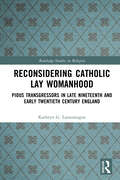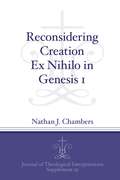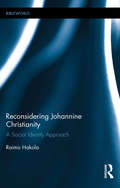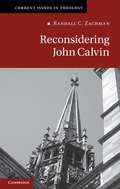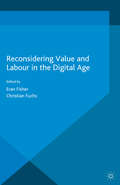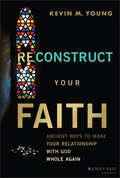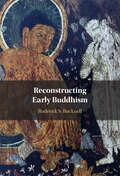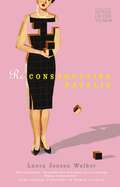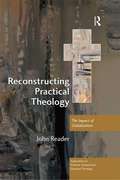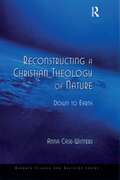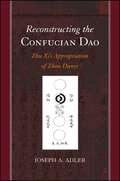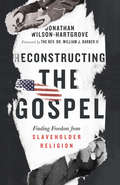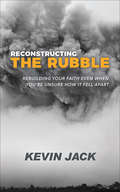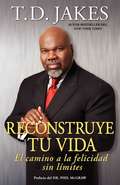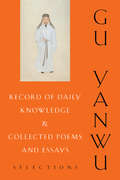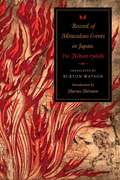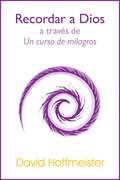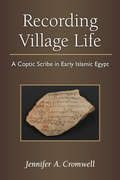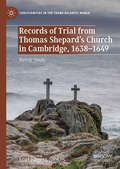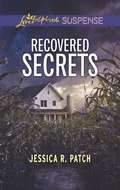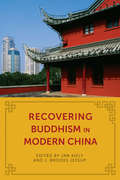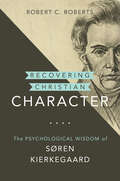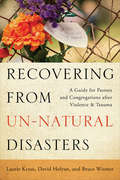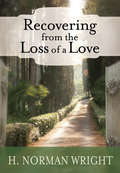- Table View
- List View
Reconsidering Catholic Lay Womanhood: Pious Transgressors in Late Nineteenth and Early Twentieth Century England (Routledge Studies in Religion)
by Kathryn G. LamontagneThis book offers a new perspective on the often-overlooked lives of lay women in the English Roman Catholic Church. It explores how over a century ago in England some exceptional Catholic lay women – Margaret Fletcher, Maude Petre, Radclyffe Hall, and Mabel Batten - negotiated non-traditional family lives and were actively practicing their faith, while not adhering to perceived structures of femininity, power, and sexuality. Focusing on c. 1880-1930, a time of dynamism and change in both England and the Church, these remarkable women represent a rethinking of what it meant to be a lay women in the English Roman Catholic Church. Their pious transgressions demonstrate the multiplicity of ways lay women powerfully asserted aspects of their faith while contravening boundaries traditionally assumed for them in an ostensibly patriarchal religion. In fact, the Church could be a place for expressions of unconventional religiosity and reinterpretations of womanhood and domesticity. Connecting together the lives of these women for the first time, this work fills a lacuna in the scholarship of modern Catholic and gender history. Drawing from private collections and numerous archives, it illustrates the surprising range of modes of Lived Catholicism and devotion to faith. Students and scholars of Catholicism, gender, and LGBTQIA+ studies will find significant merit in a book that assigns lay women a more prominent role in the English Catholic Church and offers examples of the flexibility of Roman Catholicism.
Reconsidering Creation Ex Nihilo in Genesis 1 (Journal of Theological Interpretation Supplements #19)
by Nathan J. ChambersThere is a broad consensus among biblical scholars that creation ex nihilo (from nothing) is a late Hellenistic concept with little inherent connection to Genesis 1 and other biblical creation texts. In this book, Nathan J. Chambers forces us to reconsider the question, arguing in favor of reading this chapter of the Bible in terms of ex nihilo creation and demonstrating that there is a sound basis for the early Christian development of the doctrine.Drawing on the theology of Augustine of Hippo and Thomas Aquinas, Chambers considers what the ex nihilo doctrine means and does in classical Christian dogma. He examines ancient Near Eastern cosmological texts that provide a potential context for reading Genesis 1. Recognizing the distance between the possible historical and theological frameworks for interpreting the text, he illuminates how this doctrine developed within early Christian thought as a consequence of the church’s commitment to reading Genesis 1 as part of Christian Scripture. Through original close readings of the chapter that engage critically with the work of Jon Levenson, Hermann Gunkel, and Brevard Childs, Chambers demonstrates that, far from precluding interpretive possibilities, reading Genesis 1 in terms of creation from nothing opens up a variety of interpretive avenues that have largely been overlooked in contemporary biblical scholarship.Timely and innovative, this book makes the case for a new (or recovered) framework for reading Genesis 1 that will appeal to biblical studies scholars and seminarians.
Reconsidering Johannine Christianity: A Social Identity Approach (BibleWorld)
by Raimo HakolaReconsidering Johannine Christianity presents a full-scale application of social identity approach to the Johannine writings. This book reconsiders a widely held scholarly assumption that the writings commonly taken to represent Johannine Christianity – the Gospel of John and the First, Second and Third Epistles of John – reflect the situation of an introverted early Christian group. It claims that dualistic polarities appearing in these texts should be taken as attempts to construct a secure social identity, not as evidence of social isolation. While some scholars (most notably, Richard Bauckham) have argued that the New Testament gospels were not addressed to specific early Christian communities but to all Christians, this book proposes that we should take different branches of early Christianity, not as localized and closed groups, but as imagined communities that envision distinct early Christian identities. It also reassesses the scholarly consensus according to which the Johannine Epistles presuppose and build upon the finished version of the Fourth Gospel and argues that the Johannine tradition, already in its initial stages, was diverse.
Reconsidering John Calvin
by Randall C. ZachmanRandall C. Zachman places Calvin in conversation with theologians such as Pascal, Kierkegaard, Ezra the Scribe, Julian of Norwich and Karl Barth, and attends to themes in Calvin's theology which are often overlooked. Zachman draws out Calvin's use of astronomy and great concern to see ourselves in comparison to the immensity of the universe, acknowledging in wonder and awe our nothingness before God. Throughout, Zachman presents a Calvin who seeks a route out of self-deception to self-knowledge, though Kierkegaard shows that it is love, and not judgment, that most deeply reveals us to ourselves. The book discusses Calvin's understanding of the election of the Jews and their relationship to God, and further reconsiders Calvin's understanding of judgment and how the call to love our neighbour is undermined by the formation of alliances.
Reconsidering Value and Labour in the Digital Age (Dynamics of Virtual Work)
by Christian Fuchs Eran FisherThis volume explores current interventions into the digital labour theory of value, proposing theoretical and empirical work that contributes to our understanding of Marx's labour theory of value, proposes how labour and value are transformed under conditions of virtuality, and employ the theory in order to shed light on specific practices.
Reconstruct Your Faith: Ancient Ways to Make Your Relationship with God Whole Again
by Kevin M. YoungNavigate the deepest questions of faith with the compassionate guidance of a pastor whose faith nearly fell apart This book is a must have for anyone facing a crisis of faith. When our hearts begin to question faith, we often fear voicing our concerns and confusions aloud. But questioning is inherent in the journey as we seek truth faith, as author and pastor Kevin M. Young has learned firsthand. At a time when many lack trust in clergy—and clergy members themselves are facing burnout and disillusionment—we need an honest and accountable reckoning with the role of the church in our lives. Reconstruct Your Faith takes you back to square one, helping you reengage with the church, the clergy, and God, using methods that have been essential to Christianity from its beginnings. Embark on the next phase of your spiritual journey—even if you have become disillusioned with aspects of organized religion Receive guidance and wisdom from an open-minded pastor who has struggled with his own faith Examine the role of God, Evangelicalism, and the church in your past, present, and future Return to the foundations of faith to discover your own path through questioning to a stronger spirituality This book guides you through the application of ancient spiritual practice in your life's journey, regardless of your denominational identity as a Christian or your belonging to a particular tradition. Anyone experiencing a crisis of faith or nagged by persistent questions about the direction of the church today will find healing and answers in Reconstruct Your Faith.
Reconstructing Early Buddhism
by Roderick S. BucknellBuddhist origins and discussion of the Buddha's teachings are amongst the most controversial and contested areas in the field. This bold and authoritative book tackles head-on some of the key questions regarding early Buddhism and its primary canon of precepts. Noting that the earliest texts in Pali, Sanskrit and Chinese belong to different Buddhist schools, Roderick S. Bucknell addresses the development of these writings during the period of oral transmission between the Buddha's death and their initial redaction in the first century BCE. A meticulous comparative analysis reveals the likely original path of meditative practice applied and taught by Gautama. Fresh perspectives now emerge on both the Buddha himself and his Enlightenment. Drawing on his own years of meditative experience as a Buddhist monk, the author offers here remarkable new interpretations of advanced practices of meditation, as well as of Buddhism itself. It is a landmark work in Buddhist Studies.
Reconstructing Natalie (Women Of Faith Ser.)
by Laura Jensen WalkerNatalie faces breast cancer with her friends, humor, girlfriends, and is a survivor. This is a story full of laughter, tears, hope and humor....<P><P> Natalie Moore is having a great time living her life until she confronts something that too many women fight in today's society: breast cancer. At twenty-seven years old, Natalie walks us through the emotions and reality of having breast cancer while she loses her boyfriend, her fair, and both of her breasts. She also shows us how to cope, as she makes new friends, gets reconstructive surgery that even enhances her figure, finds new love in unexpected places, and makes major changes in her life. Natalie learns to place importance in people in attributes other than the obvious and physical as she works on reconstructing herself.
Reconstructing Practical Theology: The Impact of Globalization (Explorations in Practical, Pastoral and Empirical Theology)
by John ReaderThis book argues that the discipline of practical theology needs to be re-shaped in the light of the impact of various influences created through the encounter with globalization. Essential to this is an engagement with the insights of other disciplines, e.g. sociology, politics, economics and philosophy. The content and authority of the Christian tradition is being challenged by the blurred encounters with more fluid lifestyles, alternative spiritualities and indeed other faiths as mediated through information technology and the breakdown of attachments to all forms of institutional life. Traditional ways of 'belonging' and relating to places and structures are being eroded leaving the established patterns of ministry, worship, church organisation the province of an ageing population, while those who are now more inclined to search for 'communities of interest' avoid being drawn into the practices and structures of formal religion. What is the future for practical theology in this rapidly changing context? By examining the familiar concerns of the subject John Reader shows how it is in danger of operating with 'zombie categories' - still alive but only just - and presents the possibilities for a reflexive spirituality grounded in the Christian tradition as a way into the future.
Reconstructing a Christian Theology of Nature: Down to Earth (Routledge Science and Religion Series)
by Anna Case-WintersIn the present ecological crisis, it is imperative that human beings reconsider their place within nature and find new, more responsible and sustainable ways of living. Assumptions about the nature of God, the world, and the human being, shape our thinking and, consequently, our acting. Some have charged that the Christian tradition has been more a hindrance than a help because its theology of nature has unwittingly legitimated the exploitation of nature. This book takes the current criticism of Christian tradition to heart and invites a reconsideration of the problematic elements: its desacralization of nature; its preoccupation with the human being to the neglect of the rest of nature; its dualisms and elevation of the spiritual over material reality, and its habit of ignoring or resisting scientific understandings of the natural world. Anna Case-Winters argues that Christian tradition has a more viable theology of nature to offer. She takes a look at some particulars in Christian tradition as a way to illustrate the undeniable problems and to uncover the untapped possibilities. In the process, she engages conversation partners that have been sharply critical and particularly insightful (feminist theology, process thought, and the religion and science dialogue). The criticisms and insights of these partners help to shape a proposal for a reconstructed theology of nature that can more effectively fund our struggle for the fate of the earth.
Reconstructing the Confucian Dao: Zhu Xi's Appropriation of Zhou Dunyi (SUNY series in Chinese Philosophy and Culture)
by Joseph A. AdlerZhu Xi, the twelfth-century architect of the neo-Confucian canon, declared Zhou Dunyi to be the first true sage since Mencius. This was controversial, as many of Zhu Xi's contemporaries were critical of Zhou Dunyi's Daoist leanings, and other figures had clearly been more significant to the Song dynasty Confucian resurgence. Why was Zhou Dunyi accorded such importance? Joseph A. Adler finds that the earlier thinker provided an underpinning for Zhu Xi's religious practice. Zhou Dunyi's theory of the interpenetration of activity and stillness allowed Zhu Xi to proclaim that his own theory of mental and spiritual cultivation mirrored the fundamental principle immanent in the natural world. This book revives Zhu Xi as a religious thinker, challenging longstanding characterizations of him. Readers will appreciate the inclusion of complete translations of Zhou Dunyi's major texts, Zhu Xi's published commentaries, and other primary source material.
Reconstructing the Gospel: Finding Freedom from Slaveholder Religion
by Jonathan Wilson-Hartgrove2018 Foreword INDIES Book of the Year Award Finalists - Multicultural "I am a man torn in two. And the gospel I inherited is divided." Jonathan Wilson-Hartgrove grew up in the Bible Belt in the American South as a faithful church-going Christian. But he gradually came to realize that the gospel his Christianity proclaimed was not good news for everybody. The same Christianity that sang, "Amazing grace, how sweet the sound" also perpetuated racial injustice and white supremacy in the name of Jesus. His Christianity, he discovered, was the religion of the slaveholder. Just as Reconstruction after the Civil War worked to repair a desperately broken society, our compromised Christianity requires a spiritual reconstruction that undoes the injustices of the past. Wilson-Hartgrove traces his journey from the religion of the slaveholder to the Christianity of Christ. Reconstructing the gospel requires facing the pain of the past and present, from racial blindness to systemic abuses of power. Grappling seriously with troubling history and theology, Wilson-Hartgrove recovers the subversiveness of the gospel that sustained the church through centuries of slavery and oppression, from the civil rights era to the Black Lives Matter movement and beyond. When the gospel is reconstructed, freedom rings both for individuals and for society as a whole. Discover how Jesus continues to save us from ourselves and each other, to repair the breach and heal our land.
Reconstructing the Rubble: Rebuilding Your Faith Even When You're Unsure How It Fell Apart
by Kevin JackThe lead pastor of Be Hope Church offers a guide for those who are questioning their faith and those who want to rebuild it.Questioning our long-held beliefs and assumptions can be a good thing. But deconstructing your faith can also lead to dismantling it completely. When one’s childlike faith is not sturdy enough to handle the doubts and struggles of adulthood, it needs rebuilt.In Reconstructing the Rubble, Kevin Jack walks readers through a spiritually healthy process of deconstruction and reconstruction. Jack helps readers understand what is happening with friends or family members who are suddenly questioning everything. And he offers advice on how to help loved ones rebuild their faith.
Reconstructing the Theology of Evagrius Ponticus
by Augustine CasidayEvagrius Ponticus is regarded by many scholars as the architect of the eastern heresy Origenism, as his theology corresponded to the debates that erupted in 399 and episodically thereafter, culminating in the Second Council of Constantinople in 553 AD. However some scholars now question this conventional interpretation of Evagrius' place in the Origenist controversies. Augustine Casiday sets out to reconstruct Evagrius' theology in its own terms, freeing interpretation of his work from the reputation for heresy that overwhelmed it, and studying his life, writings and evolving legacy in detail. The first part of this book discusses the transmission of Evagrius' writings, and provides a framework of his life for understanding his writing and theology, whilst part two moves to a synthetic study of major themes that emerge from his writings. This book will be an invaluable addition to scholarship on Christian theology, patristics, heresy and ancient philosophy.
Reconstruye tu vida (Reposition Yourself)
by T. D. JakesEn su œltimo libro, Reconstruye tu vida, el exitoso autor T.D. Jakes brinda consejos que ayudar n a los lectores a ajustarse a los muchos cambios que la vida trae. ƒste es un llamado a despertar y hacerte cargo de tu vida ÁAhora! Este libro no s--lo aborda las zonas donde la pasividad o incluso las decisiones torpes han ahogado la creatividad del lector, sino que tambiŽn instruye sobre la manera de controlar los cambios y sacarle el m ximo de provecho a la vida. ValiŽndose del conocimiento adquirido en m s de treinta a-os de ejercer la consejer'a y de trabajar tanto con personas ordinarias como con destacadas personalidades, Jakes abarca la creatividad econ--mica, relacional y espiritual y muestra c--mo el adaptarse a momentos de transici--n en la vida es el camino para una existencia llena de satisfacci--n en todas sus etapas. Reconstruye tu vida ofrece planes concretos para aquellos que aspiran a un futuro m s productivo. Jakes acepta la inevitabilidad del cambio, te ense-a c--mo esperarlo y asumirlo en lugar de temerle. Mezclando conocimientos religiosos y seculares, comparte una combinaci--n singular de f--rmulas pr cticas y pragm ticas pareja a la sabidur'a de la Escritura por la que Žl se destaca. Este libro es sin duda una restauraci--n para el alma. Te capacita para tener Žxito y te ofrece los instrumentos necesarios para alcanzar las ilimitadas posibilidades que resultan de hacer peque-os ajustes en tus ideas y planes. Jakes cree que no hay nada m s importante que la pr--xima decisi--n que vayas a tomar. Antes de hacer otra elecci--n, ÁŽsta es una lectura obligada!
Record of Daily Knowledge and Collected Poems and Essays: Selections (Translations from the Asian Classics)
by Yanwu GuGu Yanwu pioneered the late-Ming and early Qing-era practice of Han Learning, or Evidential Learning, favoring practical over theoretical approaches to knowledge. He strongly encouraged scholars to return to the simple, ethical precepts of early Confucianism, and in his best-known work, Rizhi lu (Record of Daily Knowledge), he applied this paradigm to literature, government, economics, history, education, and philology. This volume includes translations of selected essays from Rizhi lu and Gu Yanwu's Shiwen Ji (Collected Poems and Essays), along with an introduction explaining the personal and political dimensions of the scholar's work.Gu Yanwu wrote the essays and poems featured in this volume while traveling across China during the decades immediately after the fall of the Ming Dynasty. They merge personal observation with rich articulations of Confucian principles and are, as Gu said, "not old coin but copper dug from the hills." Like many of his contemporaries, Gu Yanwu believed the Ming Dynasty had suffered from an overconcentration of power in its central government and recommended decentralizing authority while strengthening provincial self-government. In his introduction, Ian Johnston recounts Gu Yanwu's personal history and reviews his published works, along with their scholarly reception. Annotations accompany his translations, and a special essay on feudalism by Tang Dynasty poet and scholar Liu Zongyuan (773–819) provides insight into Gu Yanwu's later work on the subject.
Record of Miraculous Events in Japan: The Nihon ryoiki (Translations from the Asian Classics)
by Burton WatsonThe Nihon ryoiki, a collection of setsuwa, or "anecdotal" tales, compiled by a monk in late-eighth- or early-ninth-century Japan, records the spread of Buddhist ideas in Japan and the ways in which Buddhism's principles were adapted to the conditions of Japanese society. Beginning in the time before Buddhism was introduced to Japan, the text captures the effects of the nation's initial contact with Buddhism—brought by emissaries from the king of the Korean state of Paekche—and the subsequent adoption and dissemination of these new teachings in Japanese towns and cities.The Nihon ryoiki provides a crucial window into the ways in which Japanese Buddhists began to make sense of the teachings and texts of their religion, incorporate religious observances and materials from Korea and China, and articulate a popularized form of Buddhist practice and belief that could extend beyond monastic centers. The setsuwa genre would become one of the major textual projects of classical and medieval Buddhism, with nearly two dozen collections appearing over the next five centuries. The Nihon ryoiki serves as a vital reference for these later works, with the tales it contains finding their way into folkloric traditions and becoming a major source for Japanese authors well into the modern period.
Recordar a Dios a Través de Un Curso de Milagros
by David Hoffmeister¡Prepárate para ver cómo se sacude tu mundo!Tu vida no volverá a ser la misma después de unirte con David Hoffmeister y sus estudiantes a profundizar en el desenmarañamiento de todo lo que crees que piensas y todo lo que crees que sabes, dando paso a experimentar quién y qué eres verdaderamente. La claridad intransigente de este libro hará que tu corazón se eleve al reconocerla."El Espíritu Santo trabajará con tus creencias, llevándote paso a paso mientras desenredas tu mente de los muchos falsos conceptos que crees que te mantienen seguro y te hacen feliz. Sólo la liberación de estas creencias falsas puede traerte Verdadera Felicidad y Paz duradera"."Me faltan las palabras para expresar mi gratitud por este libro. ¡La claridad, la alegría, la luz y el amor saltan desde cualquiera de sus páginas!" ~ Gabrielle Bernstein, autora de Miracles Now, best-seller de New York Times."Recordar a Dios a través de Un curso de milagros lleva al lector de la mano, recordándonos continuamente que cualquiera que sea el problema que se perciba, la respuesta es el perdón". ~ Jerry Jampolsky y Diane Cirincione, Center for Attitudinal Healing."Recordar a Dios a través de Un curso de milagros, el libro más reciente de David, está extraordinariamente claro y es muy fácil de leer". ~ Jon Mundy, Ph.D. autor de Vivir Un curso de milagros.La vida de David Hoffmeister es una demostración viviente de lo que es la mente despierta. Su viaje implicó el estudio de muchos senderos, que culminó en la aplicación práctica profundamente comprometida de Un curso de milagros. David tiene el asombroso don de aplicar la metafísica del Curso a las preocupaciones y problemas cotidianos dándole vida a las ideas. Las conversaciones que contiene este libro funcionan como un elixir que tiene literalmente el efecto de desenredar a la mente que está dispuesta, ¡para que pueda volver a casa con Dios!
Recording Village Life: A Coptic Scribe in Early Islamic Egypt
by Jennifer CromwellRecording Village Life presents a close study of over 140 Coptic texts written between 724–756 CE by a single scribe, Aristophanes son of Johannes, of the village Djeme in western Thebes. These texts, which focus primarily on taxation and property concerns, yield a wealth of knowledge about social and economic changes happening at both the community and country-wide levels during the early years of Islamic rule in Egypt. Additionally, they offer a fascinating picture of the scribe’s role within this world, illuminating both the practical aspects of his work and the social and professional connections with clients for whom he wrote legal documents. Papyrological analysis of Aristophanes’ documents, within the context of the textual record of the village, shows a new and divergent scribal practice that reflects broader trends among his contemporaries: Aristophanes was part of a larger, national system of administrative changes, enacted by the country’s Arab rulers in order to better control administrative practices and fiscal policies within the country. Yet Aristophanes’ dossier shows him not just as an administrator, revealing details about his life, his role in the community, and the elite networks within which he operated. This unique perspective provides new insights into both the micro-history of an individual’s experience of eighth-century Theban village life, and its reflection in the macro social, economic, and political trends in Egypt at this time. This book will prove valuable to scholars of late antique studies, papyrology, philology, early Islamic history, social and economic history, and Egyptology.
Records of Trial from Thomas Shepard’s Church in Cambridge, 1638–1649: Heroic Souls (Christianities in the Trans-Atlantic World)
by Lori Rogers-StokesThis book presents a revolutionary new reading of manuscript records left by puritan minister Thomas Shepard in Cambridge, Massachusetts that have been studied for decades as his on-the-spot recording of oral relations of faith delivered by candidates for church membership. This book proves that these records are not relations, but Shepard’s personal record of sessions of trial—meetings with candidates still working out their spiritual seeking. New transcriptions of the original manuscript records, and corresponding never-before-published writing by Shepard, dispel much of the confusion produced by the published transcriptions. Close-readings of the manuscripts, contrasted with the published transcriptions, set the stage for a new understanding of puritan spiritual preparation in Shepard’s Cambridge church. The book concludes with a challenge to the negative reading of the women’s records that is central to established scholarship, revealing their powerful, confident spiritual identities and voices.
Recovered Secrets (Mills And Boon Love Inspired Suspense Ser.)
by Jessica R. PatchA blank memory. A new life.But her borrowed time just ran outTwo years after Grace Thackery washed up on a small-town Mississippi riverbank, she has the first clue about the life she doesn’t remember: someone wants her dead. And while search-and-rescue director Hollis Montgomery’s determined to protect her, the secrets of her past are darker than they expected. Can the bond between Grace and Hollis survive her true identity…and an assassin?
Recovering Buddhism in Modern China (The Sheng Yen Series in Chinese Buddhist Studies)
by J. Brooks Jessup Jan KielyModern Chinese history told from a Buddhist perspective restores the vibrant, creative role of religion in postimperial China. It shows how urban Buddhist elites jockeyed for cultural dominance in the early Republican era, how Buddhist intellectuals reckoned with science, and how Buddhist media contributed to modern print cultures. It recognizes the political importance of sacred Buddhist relics and the complex processes through which Buddhists both participated in and experienced religious suppression under Communist rule. Today, urban and rural communities alike engage with Buddhist practices to renegotiate class, gender, and kinship relations in post-Mao China. This volume vividly portrays these events and more, recasting Buddhism as a critical factor in China's twentieth-century development. Each chapter connects a moment in Buddhist history to a significant theme in Chinese history, creating new narratives of Buddhism's involvement in the emergence of urban modernity, the practice of international diplomacy, the mobilization for total war, and other transformations of state, society, and culture. Working across an extraordinary thematic range, this book reincorporates Buddhism into the formative processes and distinctive character of Chinese history.
Recovering Christian Character: The Psychological Wisdom of Søren Kierkegaard (Kierkegaard as a Christian Thinker)
by Robert C. RobertsDiscipleship guidance from the writings of Kierkegaard Genuine Christian character often runs counter to prevailing notions of Christianity—as much in today&’s era of nationalistic religiosity as in the staid Christendom of Søren Kierkegaard&’s time. Kierkegaard responded to the hypocrisy around him by becoming a missionary of sorts in the Western world. Through his writing he exposed the illusions of conventional wisdom while advancing a compelling vision of the true Christian life that would give rise to essential virtues like faith, hope, love, patience, gratitude, and humility. What might Kierkegaard say to us today about recovering a genuine Christian character amid manifold corruptions of the gospel? Robert C. Roberts guides the reader through Kierkegaard&’s thought about character—clarifying while never unduly simplifying—to show how Kierkegaard&’s prescient psychological insights can be applied in the lives of twenty-first-century Christians interested in personal formation. Taking on a Kierkegaardian voice of his own, Roberts powerfully illustrates how virtue arises not from the mastery of individual ethical principles but from the continuity of one&’s soul with the heart of God.
Recovering From Un-Natural Disasters: A Guide For Pastors And Congregations After Violence And Trauma
by Laurie Kraus David Holyan Bruce WismerRecovering from Un-Natural Disasters is a must-read handbook for pastors and church leaders of communities who could or perhaps already have experienced an un-natural disaster, such as gun violence, suicides, or sexual abuse. <P><P>Unlike natural disasters, un-natural disasters deal with the concept of sin and require a different recovery strategy. In this book, readers will explore the four phases of human-caused disaster — Devastation and Heroism, Disillusionment, Reforming, and Wisdom — and receive step-by-step suggestions to use with their faith community during the recovery process. Example worship resources, including prayers, music suggestions, and sermons that are appropriate to use during periods of trauma and recovery, are included.
Recovering From the Loss of a Love
by Norm WrightHow do you get over a break up? How do you move on when someone you love walks away? Whether it's the loss of love through a breakup or the agony of having someone not love you back, this encouraging book by Dr. Norm Wright helps you move through the stages of grief and loss, and guides you toward wholeness and hope.It feels like the deepest hurt in the world...and you don't know how you can ever move on. People tell you that ""time heals all wounds,"" but that doesn't help with the pain you feel right now. Expert Dr. Norm Wright understands. He has worked with those devastated by heartache for over 4 decades. He knows how to compassionately and practically help you work through the feeling of loss, grief, and rejection--showing you how to resist blaming God, how to make sense of it all, and how to finally move forward. * Find out the factors that make certain losses more difficult than others. * Discover how to work through the emotions caused by grief and loss. * Learn the 5 steps to letting go and the 10 tips on how to move on.* Recognize whether you are afraid of loving again (and find out how to overcome that fear) Heartbreak, despair, loneliness, numbness--these are our feelings when we experience a broken relationship. But, these are not feelings we need to carry with us forever. Experience the peace that comes from letting God be the healing balm for your wounded heart. Perfect for--* Personal use/growth* To give to someone who is struggling with the loss of love * Ministry training tool (Church leaders, teachers, prayer team, etc.)* Christian divorce recovery group* Christian counseling resource
